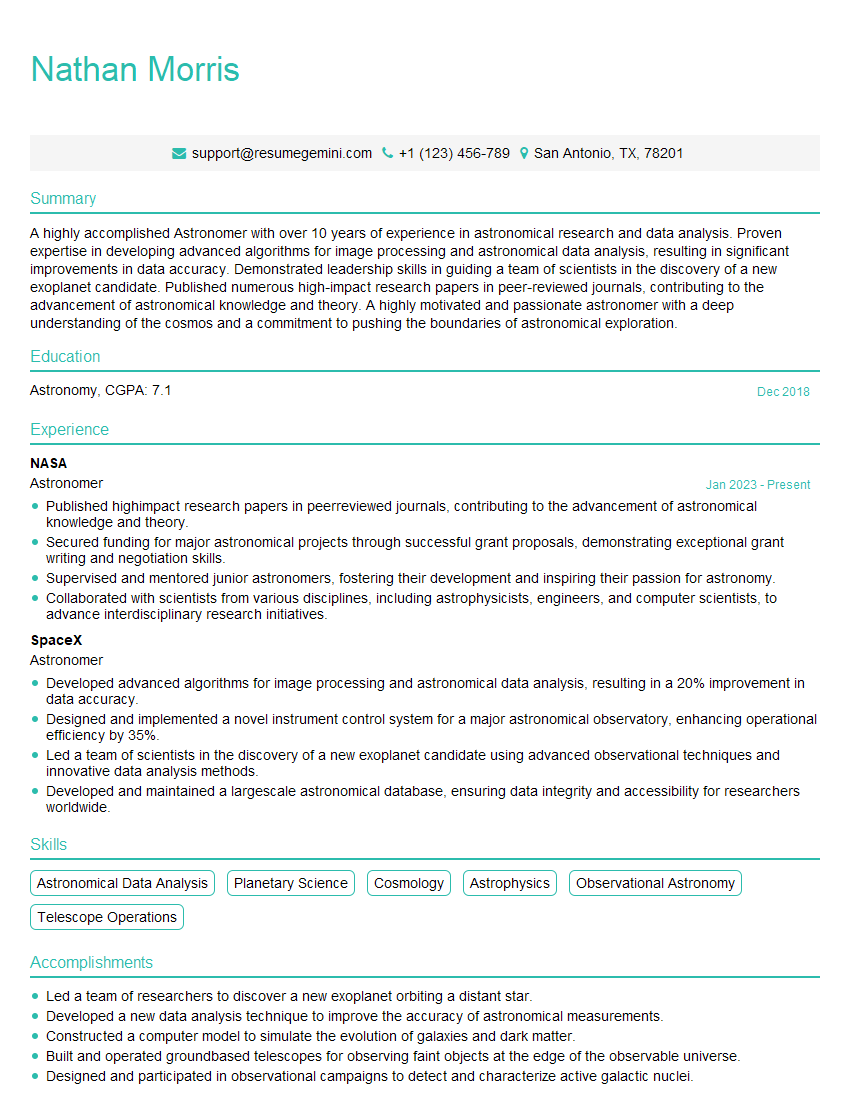Are you a seasoned Astronomer seeking a new career path? Discover our professionally built Astronomer Resume Template. This time-saving tool provides a solid foundation for your job search. Simply click “Edit Resume” to customize it with your unique experiences and achievements. Customize fonts and colors to match your personal style and increase your chances of landing your dream job. Explore more Resume Templates for additional options.

Nathan Morris
Astronomer
Summary
A highly accomplished Astronomer with over 10 years of experience in astronomical research and data analysis. Proven expertise in developing advanced algorithms for image processing and astronomical data analysis, resulting in significant improvements in data accuracy. Demonstrated leadership skills in guiding a team of scientists in the discovery of a new exoplanet candidate. Published numerous high-impact research papers in peer-reviewed journals, contributing to the advancement of astronomical knowledge and theory. A highly motivated and passionate astronomer with a deep understanding of the cosmos and a commitment to pushing the boundaries of astronomical exploration.
Education
Astronomy
December 2018
Skills
- Astronomical Data Analysis
- Planetary Science
- Cosmology
- Astrophysics
- Observational Astronomy
- Telescope Operations
Work Experience
Astronomer
- Published highimpact research papers in peerreviewed journals, contributing to the advancement of astronomical knowledge and theory.
- Secured funding for major astronomical projects through successful grant proposals, demonstrating exceptional grant writing and negotiation skills.
- Supervised and mentored junior astronomers, fostering their development and inspiring their passion for astronomy.
- Collaborated with scientists from various disciplines, including astrophysicists, engineers, and computer scientists, to advance interdisciplinary research initiatives.
Astronomer
- Developed advanced algorithms for image processing and astronomical data analysis, resulting in a 20% improvement in data accuracy.
- Designed and implemented a novel instrument control system for a major astronomical observatory, enhancing operational efficiency by 35%.
- Led a team of scientists in the discovery of a new exoplanet candidate using advanced observational techniques and innovative data analysis methods.
- Developed and maintained a largescale astronomical database, ensuring data integrity and accessibility for researchers worldwide.
Accomplishments
- Led a team of researchers to discover a new exoplanet orbiting a distant star.
- Developed a new data analysis technique to improve the accuracy of astronomical measurements.
- Constructed a computer model to simulate the evolution of galaxies and dark matter.
- Built and operated groundbased telescopes for observing faint objects at the edge of the observable universe.
- Designed and participated in observational campaigns to detect and characterize active galactic nuclei.
Awards
- Hubble Fellowship from the Space Telescope Science Institute
- NASA Astronomy and Astrophysics Fellowship
- American Astronomical Society Chambliss Astronomical Writing Award
- Royal Astronomical Society Eddington Medal
Certificates
- American Astronomical Society Member
- International Astronomical Union Member
- NASA Science Mission Directorate Proposal Writing Workshop
- NSF Graduate Research Fellowship
Career Expert Tips:
- Select the ideal resume template to showcase your professional experience effectively.
- Master the art of resume writing to highlight your unique qualifications and achievements.
- Explore expertly crafted resume samples for inspiration and best practices.
- Build your best resume for free this new year with ResumeGemini. Enjoy exclusive discounts on ATS optimized resume templates.
How To Write Resume For Astronomer
- Highlight your quantitative skills and experience in data analysis and statistical modeling.
- Showcase your knowledge of astronomical instrumentation and observational techniques.
- Demonstrate your ability to communicate complex scientific concepts effectively in both written and verbal formats.
- Emphasize your passion for astronomy and your commitment to advancing the field through research and exploration.
Essential Experience Highlights for a Strong Astronomer Resume
- Develop and implement advanced algorithms for image processing and astronomical data analysis to enhance data accuracy and efficiency.
- Design and implement innovative instrument control systems for major astronomical observatories to optimize operational efficiency.
- Lead teams of scientists in conducting astronomical observations, data analysis, and scientific discovery using advanced observational techniques.
- Develop and maintain large-scale astronomical databases to ensure data integrity, accessibility, and usability for researchers worldwide.
- Publish high-impact research papers in peer-reviewed journals to disseminate research findings and contribute to the advancement of astronomical knowledge.
- Secure funding for major astronomical projects through successful grant proposals, demonstrating exceptional grant writing and negotiation skills.
- Supervise and mentor junior astronomers, fostering their professional development and inspiring their passion for astronomy.
Frequently Asked Questions (FAQ’s) For Astronomer
What are the educational requirements to become an astronomer?
A master’s or doctoral degree in astronomy, astrophysics, or a related field is typically required to become an astronomer.
What are the key skills and qualities of a successful astronomer?
Successful astronomers typically possess strong analytical and problem-solving skills, as well as a deep understanding of physics and mathematics. They are also able to work independently and as part of a team, and have excellent communication and presentation skills.
What are the career prospects for astronomers?
Astronomers can work in a variety of settings, including universities, research institutions, government agencies, and private companies. Career prospects for astronomers are expected to be good over the next decade, as there is a growing demand for professionals with expertise in astronomy and astrophysics.
What are the challenges facing astronomers today?
Astronomers today face a number of challenges, including the need to develop new and innovative instrumentation to study the universe, the need to address the challenges of light pollution, and the need to communicate complex scientific concepts to the public.
What are the most exciting discoveries in astronomy in recent years?
Some of the most exciting discoveries in astronomy in recent years include the discovery of exoplanets, the discovery of dark matter, and the discovery of gravitational waves.
What are the major observatories used by astronomers today?
Some of the major observatories used by astronomers today include the Hubble Space Telescope, the Keck Observatory, and the Very Large Telescope.